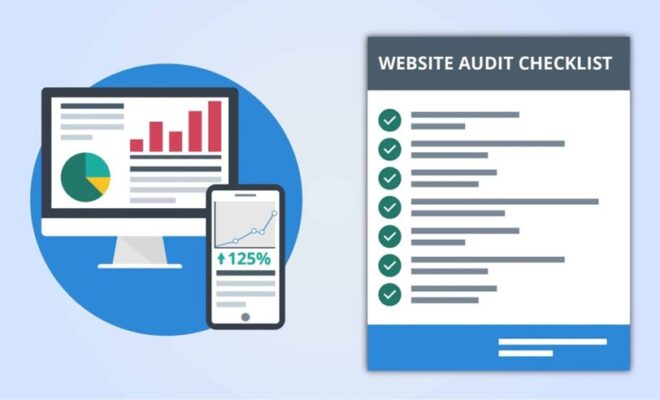Website Audit: What Is It and Why Is It Important?

A website audit is one of the most critical steps in ensuring a site delivers real value. This process goes far beyond checking for broken links or optimising load times. It’s all about evaluating every aspect of a website to determine what’s working and how improvements can be made. Here is what you need to know about this process and its value to businesses.
What Is a Website Audit?
A website audit is an in-depth analysis of a website’s health and performance. It covers a range of elements, from technical functionality and search engine optimisation to content quality and user experience. Audits can reveal hidden weaknesses in a website’s infrastructure, content, or usability, helping businesses make informed decisions on upgrades or redesigns.
The scope of a website audit depends on the business’s goals and the specifics of the website. A smaller website audit might focus solely on SEO, examining how well the site ranks on search engines. A comprehensive audit, however, will delve into technical aspects, performance, content, design, and overall UX, providing a full picture of how well the website serves its intended audience.
The Technical Side of a Website Audit
Technical health is the foundation of a successful website. Without a solid technical base, even the best content and design can falter. This aspect of a website audit focuses on elements such as site structure, code quality, mobile responsiveness, load speeds, and security. Given the rising emphasis on mobile accessibility, ensuring a site functions well on both mobile and desktop devices is essential.
Load speed is a key metric in any website audit, as it affects both user satisfaction and SEO rankings. Slow websites drive users away, and search engines penalise sites with poor load times. A website audit identifies what’s slowing down the site, such as unoptimised images, inefficient code, or server issues.
Security is also increasingly important. Website audits examine SSL certification, potential vulnerabilities, and compliance with data protection laws. These elements are especially critical for e-commerce websites or any site that collects sensitive user data.
SEO and Content Evaluation
SEO is one of the primary focuses of a website audit because it directly impacts the website’s visibility in search engine results. Without a strong SEO foundation, even the most beautifully designed website can go unnoticed.
An SEO audit reviews factors such as keyword relevance, metadata, internal linking, and backlink quality. If any of these elements are lacking or poorly optimised, working with GWM SEO company can provide expert guidance on ways to enhance your SEO performance.
Content quality is integral to a strong online presence. A website audit assesses whether the content addresses users’ search intent, uses the right keywords, and incorporates effective calls to action. Effective content can not only increase user engagement but also build trust, creating long-term benefits for the business.
User Experience and Design Assessment
User experience is paramount when it comes to retaining visitors and converting them into loyal customers. A website audit considers all elements affecting UX, from site navigation to the aesthetics and usability of each page. An intuitive and clean design keeps visitors engaged. Confusing layouts, cluttered content, or unresponsive elements can drive users to competitor sites.
An audit examines the user journey and how visitors interact with the website, identifying potential areas for improvement. For instance, if users frequently abandon the website after landing on a specific page, this may indicate issues with page content or design.
A website’s design should also reflect current trends and user expectations. Users expect sleek, fast, and easy-to-navigate websites. Through an audit, businesses can ensure that their site remains competitive, offering a user-friendly experience that stands out.
The Importance of Regular Website Audits
Regular website audits are essential in keeping a website up-to-date with evolving industry standards and technology advancements. With frequent changes in search engine algorithms and shifting user expectations, it’s easy for a website to become outdated.
Website audits enable businesses to make incremental improvements rather than waiting until issues become severe enough to necessitate a complete overhaul. This proactive approach saves time, resources, and money in the long run.
Whether the business aims to attract local customers or reach an international audience, a well-audited website increases credibility. It also provides an edge in search engine rankings and user engagement.
Measuring the Success of a Website Audit
After a website audit, businesses can measure success through various metrics that align with their goals. Common indicators include improved load times, higher search engine rankings, lower bounce rates, and increased conversions. By tracking these metrics, businesses can assess the impact of changes made following the audit.
A successful website audit provides businesses with a clear, data-driven roadmap for future website development. It reveals insights into audience behaviour, preferences, and needs, helping to shape future content, design, and marketing strategies.
Why Every Business Should Consider a Website Audit
Website audits are critical in ensuring a website remains effective and aligned with business goals. As online platforms become more advanced, so do user expectations and search engine algorithms. Website audits offer an invaluable opportunity to evaluate and improve every aspect of a site, from technical structure and security to SEO and content quality.
For businesses operating in competitive markets, a website audit is not just a one-time task but an ongoing necessity. By regularly auditing their websites, businesses can stay current, relevant, and competitive. This is what ultimately fosters growth, engagement, and success in the digital world.
The Risks of Neglecting Website Audits
When businesses overlook regular website audits, they risk a range of issues that can negatively impact their online presence and profitability. Without routine checks, websites can become outdated, insecure, and difficult to navigate, leading to a poor user experience and a loss of customer trust.
Technical issues may go unnoticed, causing slow load times or broken pages that frustrate visitors. Security vulnerabilities can also accumulate, putting customer data and sensitive business information at risk of cyberattacks.
Conclusion
Website audits are no longer optional. Instead, they’ve become essential for any business committed to achieving long-term digital success. Through thorough analysis and proactive adjustments, website audits provide the insight and guidance needed to create a powerful, user-friendly, and effective online presence.












